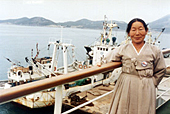"Director Mun jeong-hyun's own journey to discover the truth about his family's strife-torn history becomes a cool-headed but moving document in "Grandmother's Flower," a tale of village tensions, political torture and killings, and internecine squabbles. Though the cast of real-life characters in the extended family is predictably huge, Mun guides the viewer clearly through the maze, and supports his research with a weath of fascinating photo material."
- Derek Elley, The Biz, Variety
"The uncovering of personal tragedies reveals an intricate narrative, illuminating issues that the nation as a whole is still reluctant to confront. The Korean peninsula is divided along ideological lines, but there are other lines that cut deeper: the trauma of Japanese oppresion and internecine conflicts over class disparities that stem from feudal times."
- Asian American International Film Festival
"Korean filmmaker Mun Jeong-hyun's haunting documentary GRANDMOTHER'S FLOWER examines post-World War II chaos in a country divided along hostile political lines, as seen through the lens of the director's tumultuous family history… Combining substantial interviews with archival photos, GRANDMOTHER'S FLOWER offers invaluable insights into contemporary Korea's struggle to move beyond the dark periods of Japanese colonial rule, the Korean War, and subsequent division of the country. Highly Recommended."
- P. Hall, Video Librarian Magazine
"HIGHLY RECOMMENDED. This documentary by Korean filmmaker Jeong-hyun Mun tracks a complex family history spanning from the period of Japanese colonialism through the aftermath of the Korean War to the present. The film illustrates how war and conflict impact communities by forcing new political alliances and ideologies that shape societies, specifically the social and political formations of the Korean nation state. Mun’s family history, as presented by testimonials of many relatives, unveils conflicts of class, personal tragedies and displacement, in North Korea and Japan, providing a glimpse of narratives of many contemporary Korean families."
- Educational Media Reviews Online
